|
|
|
Sort Order |
|
|
|
Items / Page
|
|
|
|
|
|
|
| Srl | Item |
| 1 |
ID:
104843
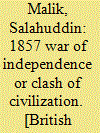

|
|
|
|
|
| Publication |
Oxford, Oxford University Press, 2008.
|
| Description |
xxvii,281p.
|
| Standard Number |
9780195474220, hbk
|
|
|
|
|
|
|
|
|
|
|
|
Copies: C:1/I:0,R:0,Q:0
Circulation
| Accession# | Call# | Current Location | Status | Policy | Location |
| 056115 | 954.031/MAL 056115 | Main | On Shelf | General | |
|
|
|
|
| 2 |
ID:
103664


|
|
|
|
|
| Publication |
2011.
|
| Summary/Abstract |
This article addresses the question whether membership in the 'Anglosphere' - a grouping of English-speaking states/nations - impacts the likelihood of participation in US-led coalitions of the willing. I translate the Anglosphere into International Relations (IR) theory using a tripartite division of realism, liberalism and constructivism. In a quantitative empirical analysis of a sample of US-led military coalitions between 1950 and 2001, I find robust evidence of what can be seen as the Anglosphere effect: all else constant, English-speaking states/nations tend to be more willing to join US-led military coalitions than states/nations selected at random. I conclude with a discussion of future research avenues in the Anglosphere agenda in IR.
|
|
|
|
|
|
|
|
|
|
|
|
|
|
|
|
| 3 |
ID:
119389
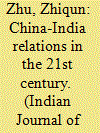

|
|
|
| 4 |
ID:
096097


|
|
|
|
|
| Publication |
2010.
|
| Summary/Abstract |
The clash of civilizations is essentially the conflict among individuals form different civilizations. Individuals struggle for access to survival resources, and the scarcity of resources is the fundamental issue. When it becomes difficult to access resources alone, individuals tend to organize themselves in certain ways, and civilization could be one fo these ways. However, the conflicts among different civilization do not arise as easily as Huntington imagines, and the existence of buffer zones between civilizations is one of the facts that constrain conflict. Buffer zones appear with the emergence of civilization boundaries and are clearly visible in macro and micro cross sections. The buffer zones are the concrete expression of Knowledge shared by civilization and their exchange, interracial neighbouhoods, mixed marriages and so on.
|
|
|
|
|
|
|
|
|
|
|
|
|
|
|
|
| 5 |
ID:
003000
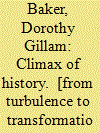

|
|
|
|
|
| Publication |
Hawthorne, Ray Leonardo and Sons., 1987.
|
| Description |
ii, 54p.Pbk
|
|
|
|
|
|
|
|
|
|
|
|
Copies: C:1/I:0,R:0,Q:0
Circulation
| Accession# | Call# | Current Location | Status | Policy | Location |
| 034662 | 940/BAK 034662 | Main | On Shelf | General | |
|
|
|
|
| 6 |
ID:
121639
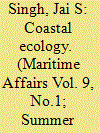

|
|
|
|
|
| Publication |
2013.
|
| Summary/Abstract |
Preservation and protection of coastal ecology and the marine environment are the most significant challenges before the world community. The UN Convention on the Law of Sea, 1982 has made extensive provisions for the protection and preservation of the marine environment. The Constitution of India is probably first in the world that makes provision for the preservation and protection of the environment. The Ministry of Environment and Forests undertook an exercise to issue the Coastal Regulation Zone Notification, 1991 to preserve, protect and promote coastal ecology. Furthermore, in a number of decisions, the Supreme Court has made effective observations for the proper preservation, protection and promotion of coastal ecology and the marine environment. The present paper highlights the problem of global warming, coastal ecology and the marine environment. Coastal States have a special interest in protecting and preserving their coastlines. Due to unique peculiar characteristics, the coastal zone is a meeting point for land, sea and inland waters. Coastal zones have played significant role in the development of culture and civilizations. It is the duty of the coastal States to preserve and protect coastal ecology and the marine environment.
|
|
|
|
|
|
|
|
|
|
|
|
|
|
|
|
| 7 |
ID:
052445
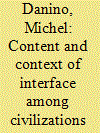

|
|
|
|
|
| Publication |
Apr-Jun 2004.
|
|
|
|
|
|
|
|
|
|
|
|
|
|
|
|
| 8 |
ID:
127166
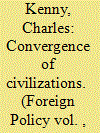

|
|
|
| 9 |
ID:
095108
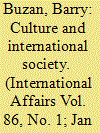

|
|
|
|
|
| Publication |
2010.
|
| Summary/Abstract |
This article investigates a hypothesis drawn from Martin Wight, that a society of states lacking a shared culture, as a result of expansion beyond its original base, will be unstable. This instability hypothesis has been influential in how the English School has presented the history of the expansion of European international society to a global scale. The article starts by offering two models of how a global international society could have come about since the late classical era: a multicultural encounter among several expanding civilizations (polycentric), or the takeover of the system by one centre (monocentric). Using these models as a backdrop, two accounts of the expansion story are developed. The Vanguardist account emphasizes the exceptionalism of European culture, posits a 500-year period of western domination, sees multiculturalism and the decline of western power as problematic, and tends to pessimism about the future of international society. The Syncretist account emphasizes the permanence of cross-cultural exchange, posits only a 200-year period of western dominance, sees culture and international society as evolving together, and is not pessimistic about the stability of international society. These two models and two accounts are then used to assess the possible future of international society. The article argues that culture is less of a problem for international society than Wight, and much of the English School, suppose. The evidence for the substantial success of syncretism is strong and provides considerable stability to most of the likely outcomes. The key problem is not culture, but socio-political structure. How can what North et al. call natural states and open access orders find shared practices and institutions that do not destabilize international society?
|
|
|
|
|
|
|
|
|
|
|
|
|
|
|
|
| 10 |
ID:
093995
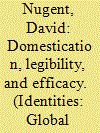

|
|
|
| 11 |
ID:
084655
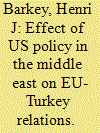

|
|
|
| 12 |
ID:
174918
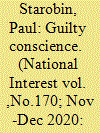

|
|
|
| 13 |
ID:
067869


|
|
|
|
|
| Publication |
New Delhi, Motilal Banarsidas, 2003.
|
| Description |
700p.hbk
|
| Contents |
Vol. 4: The age of acievement: A.D. to the end of the fifteenth century
|
| Standard Number |
8120815963
|
|
|
|
|
|
|
|
|
|
|
|
Copies: C:1/I:0,R:0,Q:0
Circulation
| Accession# | Call# | Current Location | Status | Policy | Location |
| 050817 | 958/BOS 050817 | Main | On Shelf | General | |
|
|
|
|
| 14 |
ID:
118906
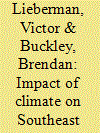

|
|
|
|
|
| Publication |
2012.
|
| Summary/Abstract |
The recent discovery of continuous tree-ring series starting as early as 1030 CE has for the first time made possible the reconstruction of historical climates for much of mainland Southeast Asia. Perhaps the most dramatic finding is that wide cyclic fluctuations in the reach and volume of monsoon rains contributed substantially to both the genesis and the collapse of the charter civilizations of Angkor, Pagan, and Dai Viet. From circa 1450-1820 climate continued to influence political and economic development, but its impact appears to have diminished both because the amplitude of hydrological fluctuations decreased markedly, and because new sources of power rendered early modern Southeast Asian states more resilient. A pioneering collaborative effort by a historian and a paleoclimatologist, this paper promises three benefits: It can help to solve a variety of local historiographic puzzles, it can facilitate construction of a synchronized historical narrative for mainland Southeast Asia as a whole, and it can aid comparisons between mainland Southeast Asia and other sectors of Eurasia.
|
|
|
|
|
|
|
|
|
|
|
|
|
|
|
|
| 15 |
ID:
108375
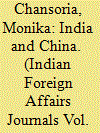

|
|
|
| 16 |
ID:
120608
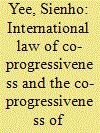

|
|
|
|
|
| Publication |
2013.
|
| Summary/Abstract |
This Editorial Comment applies the author's concept of the international law of co-progressiveness to civilizations. Civilizations cannot take the place of States but can play the role of promoters of co-progressiveness. The success of this role depends on the progressiveness of a particular civilization and its ability to manage inter-civilizational relations. Three tools for managing inter-civilizational relations are suggested: (1) a "two-men mindedness" attitude when taking action; (2) a Thomas Henry Sanderson lens when perceiving a challenge or disadvantage; and (3) benign competition.
|
|
|
|
|
|
|
|
|
|
|
|
|
|
|
|
| 17 |
ID:
110074
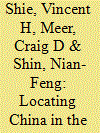

|
|
|
|
|
| Publication |
2012.
|
| Summary/Abstract |
In the early nineteenth century a 'great divergence' occurred that bifurcated civilizations into East and West, sending the former into descent. Since the 1950s, however, the economic growth of East Asia has been nothing short of remarkable. This development has led some scholars, such as Giovanni Arrighi and the colleagues of Takeshi Hamashita, to optimistically suggest the resurgence of East Asia in general and the re-centering of China in particular, a line of reasoning that appears to draw on memories of the China-centered tributary trade system defining the region for centuries. For these scholars, the rise of East Asia after 1950 can be seen as a reversal of the great divergence. We challenge this view. Data show that China has yet to prepare for the new knowledge-based economy. Furthermore, we raise the possibility that Japan may move farther away from, rather than closer to, the traditional center of China in the twenty-first-century East Asian interstate system.
|
|
|
|
|
|
|
|
|
|
|
|
|
|
|
|
| 18 |
ID:
001682
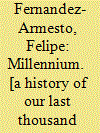

|
|
|
|
|
| Publication |
London, Black Swan Books, 1995.
|
| Description |
xvi, 830p.Pbk
|
| Standard Number |
0552994820
|
|
|
|
|
|
|
|
|
|
|
|
Copies: C:1/I:0,R:0,Q:0
Circulation
| Accession# | Call# | Current Location | Status | Policy | Location |
| 041293 | 909/FER 041293 | Main | On Shelf | General | |
|
|
|
|
| 19 |
ID:
007073
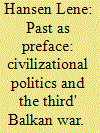

|
|
|
|
|
| Publication |
May 2000.
|
| Description |
345-362
|
|
|
|
|
|
|
|
|
|
|
|
|
|
|
|
| 20 |
ID:
172931
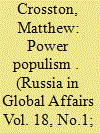

|
|
|
|
|
| Summary/Abstract |
In traditional understandings of classical populism, power is commonly
defined as being in need of devolving from the corridors of power and
out to a more grassroots foundation. At its core, populism was usually
seen as a belief in empowering regular people. ‘Regular people’ were
typically defined as being disconnected, if not outright disenfranchised,
from central power and outside the realm of the ‘elite.’ This paper
investigates the modern phenomenon in Russia and America that turns
these traditional concepts completely on their head. Rather than being
a movement engineered against elite political insiders, populism in
America and Russia currently seems to be occupied by the elites of
society. Ironically, these elites position themselves as the chosen
representatives of the disenfranchised. These strange bedfellows have
arguably produced a new form of ‘power populism’: instead of being
focused on removing power from the state, this populism is founded
more upon strengthening the global position of the state while tacitly
dismissing/attacking the perceived intellectual elite of each society.
|
|
|
|
|
|
|
|
|
|
|
|
|
|
|
|
|
|
|
|
|